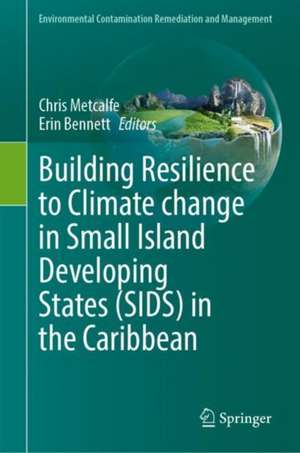Building Resilience to Climate Change in Small Island Developing States (SIDS) in the Caribbean: Environmental Contamination Remediation and Management
Editat de C. D. Metcalfe, Erin R. Bennetten Limba Engleză Hardback – 26 aug 2023
Preț: 1105.19 lei
Preț vechi: 1347.79 lei
-18% Nou
Puncte Express: 1658
Preț estimativ în valută:
211.48€ • 230.44$ • 178.20£
211.48€ • 230.44$ • 178.20£
Carte disponibilă
Livrare economică 02-16 aprilie
Preluare comenzi: 021 569.72.76
Specificații
ISBN-13: 9783031373756
ISBN-10: 3031373758
Pagini: 95
Ilustrații: XIV, 95 p. 28 illus., 25 illus. in color.
Dimensiuni: 155 x 235 mm
Greutate: 0.34 kg
Ediția:1st ed. 2023
Editura: Springer Nature Switzerland
Colecția Springer
Seria Environmental Contamination Remediation and Management
Locul publicării:Cham, Switzerland
ISBN-10: 3031373758
Pagini: 95
Ilustrații: XIV, 95 p. 28 illus., 25 illus. in color.
Dimensiuni: 155 x 235 mm
Greutate: 0.34 kg
Ediția:1st ed. 2023
Editura: Springer Nature Switzerland
Colecția Springer
Seria Environmental Contamination Remediation and Management
Locul publicării:Cham, Switzerland
Cuprins
Chapter 1: An Introduction to Small Island Developing States and Building Resilience to Climate Change in the Caribbean.- Chapter 2: Principles of Systemic Resilience to Climate Change in Small Island Developing States.- Chapter 3: Nature-based Solutions for Building Resilience in Small Island Developing States in the Caribbean.- Chapter 4: Assessment of the Effectiveness of Nature-based Solutions for Land Restoration in St. Kitts and Nevis.- Chapter 5: Building Resilience for Caribbean Nations: Showstoppers and Opportunities from Economics and Governance.
Textul de pe ultima copertă
This book summarizes approaches that integrate the environmental, economic, and physical domains with the values, and needs of the population are necessary to develop sustainable strategies that will enhance the resilience of small islands, within the context of inter-island differences in geology, ecology, societal attitudes, governance, and human and economic resources. The impacts of coastal damage and flooding are predicted to worsen during this century due to rising sea levels and increases in the frequency and intensity of storms. The usual approach to coastal protection in Small Island Developing States (SIDS) in the Caribbean is to view both the hazards and the solutions from the “Ocean Side” perspective and to react with “hard” engineering solutions. These structural engineering approaches prevent damage and disruptions to services associated with predictable events but leave communities vulnerable to future events that do not follow historical trends. Furthermore, engineeredstructures do not adequately address the systemic nature of climate change nor account for compounding threats (e.g., coincidence of hurricane season and global pandemics). To move from this traditional strategy for managing risks from coastal hazards, we need to consider a portfolio of solutions that enhance island protection and community resilience. Nature-Based Solutions (NBS) are gaining attention as practical and cost-effective approaches for mitigating climate-based stressors. However, deployment of NBS strategies requires spatial coordination within the context of “ridge to reef” or integrated water resource management (IWRM) approaches that include the creation of conditions for social acceptance, equity, effective governance, and financial incentives.
Caracteristici
Is s timely summary of some of the major issues to climate change and resiliency in Small Island Developing States Develops sustainable strategies that will enhance the resilience of small islands Summarizes inter-island differences in geology, ecology, societal attitudes, governance, and economic resources









